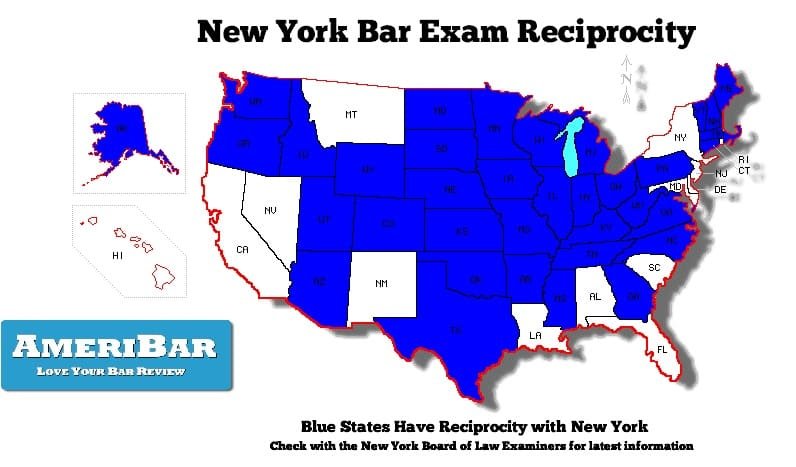New York Bar Exam Reciprocity
Reciprocity Overview
The New York Board of Bar Examiners is the administrative organization charged with enforcing the New York bar exam eligibility requirements. If you have any specific questions regarding your eligibility, you should contact the examiners directly.
The New York state bar has reciprocity with several jurisdictions. Reciprocity is when one jurisdiction recognizes the license of a lawyer from another jurisdiction. If a lawyer is admitted to the bar in a state which has reciprocity with New York, New York would admit the lawyer to the bar based on reciprocity. The lawyer is not required to take the New York bar exam.
The following example illustrates reciprocity. New York (the local jurisdiction) will allow an attorney admitted to the bar in Arizona (the other jurisdiction) admission to the New York bar without the attorney having to take the New York bar exam. However, reciprocity is only permitted if Arizona also allows a lawyer admitted to the bar in New York admission to the bar of Arizona without the lawyer having to take the Arizona bar exam.
Reciprocity Conditions
In practice, reciprocity is more complex than described in the example because jurisdictions with “reciprocity” typically impose conditions in addition to the attorney being licensed in the other jurisdiction. A common condition requires that the attorney have practiced law in the other jurisdiction for a specified number of years.
Reciprocity is often referred to by “admission by waiver” or “admission on motion.“
Admission by Waiver
Pursuant to admission by waiver, an attorney may be “waived in” to the local jurisdiction’s bar.
Admission on Motion
Pursuant to admission on motion, an attorney may make a motion for admission to the local jurisdiction’s bar. The local jurisdiction would grant the motion if the conditions for reciprocity are satisfied.
Requirements for Admission, on Motion, to the New York Bar
New York Rule of Admission Section 520.10 provides for admission on motion. The New York State Board of Law Examiners allows for the attorney’s admission on motion to the New York State Bar, if the attorney:
- has practiced law for five of the preceding seven years,
- is admitted to practice law in a least one reciprocal jurisdiction, and
- has graduated from an American Bar Association approved law school.
Jurisdictions That Have Reciprocity with New York
Reciprocity agreements change from year-to-year. Please check with the New York Board of Law Examiners for the latest information. At the time of publication, for the purposes of admission on motion, the following 40 jurisdictions have reciprocity with New York:
- Alaska
- Arizona
- Arkansas
- Colorado
- Connecticut
- District of Columbia
- Georgia
- Idaho
- Illinois
- Indiana
- Iowa
- Kansas
- Kentucky
- Maine
- Massachusetts
- Michigan
- Minnesota
- Mississippi
- Missouri
- Montana
- Nebraska
- New Hampshire
- New Jersey
- New Mexico
- North Carolina
- North Dakota
- Ohio
- Oklahoma
- Oregon
- Pennsylvania
- South Dakota
- Tennessee
- Texas
- Utah
- Vermont
- Virginia
- Washington
- West Virginia
- Wisconsin
- Wyoming
New York Bar Exam Reciprocity Jurisdictions

Applying for Admission Without Examination to the New York Bar
In order to apply for admission by motion, an attorney needs to obtain a Certificate of Legal Education from the New York Board of Law Examiners. An attorney must pay a $400 fee when applying for this certification as provided in the packet for admission on motion downloadable from the New York Board of Law Examiners. In addition to submitting the application form and fee to the New York law examiners, the attorney must have their law school complete and return a form directly to the New York law examiners.
